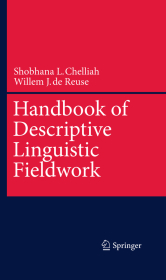 Neuerscheinungen 2014Stand: 2020-02-01 |
Schnellsuche
ISBN/Stichwort/Autor
|
Herderstraße 10
10625 Berlin
Tel.: 030 315 714 16
Fax 030 315 714 14
info@buchspektrum.de |

Shobhana L. Chelliah, Willem J. de Reuse
(Beteiligte)
Handbook of Descriptive Linguistic Fieldwork
2011. 2014. xix, 492 S. 235 mm
Verlag/Jahr: SPRINGER NETHERLANDS; SPRINGER 2014
ISBN: 9400792182 (9400792182)
Neue ISBN: 978-9400792180 (9789400792180)
Preis und Lieferzeit: Bitte klicken
This essential handbook provides the most comprehensive reference on linguistic fieldwork on the market. Based on the experiences of two veteran linguistic fieldworkers, it brings together all the reader needs to carry out successful linguistic fieldwork.
The Handbook of Descriptive Linguistic Fieldwork is the most comprehensive reference on linguistic fieldwork on the market bringing together all the reader needs to carry out successful linguistic fieldwork. Based on the experiences of two veteran linguistic fieldworkers and advice from more than a twenty active fieldwork researchers, this handbook provides an encyclopedic review of current publications on linguistic fieldwork and surveys past and present approaches and solutions to problems in the field, and the historical, political, and social variables correlating with fieldwork in different areas of the world. The discussion of the ethical dimensions of fieldwork, as well as what constitutes the "typical" linguistic fieldwork setting or consultant is explored from multiple perspectives relevant to fieldwork on every continent. Included is information omitted in most other texts on the subject such as the collection, representation, management, and methods of extracting grammatical information from discourse and conversational data as well as the relationship between questionnaire-based elicitation, text-based elicitation, and philology, and the need for combinations of these methods. The book is useful before, during and after linguistic field trips since it provides extensive practical macro and micro organization and planning fieldwork tips as well as a handy sketch of major typological features for use in linguistic analysis. Comprehensive references are provided at the end of each chapter as resources relevant to the reader´s particular interests.
Acknowledgements.- Chapter 1. Introduction.- Chapter 2. Definition and Goals of Descriptive Linguistic Fieldwork.- Chapter 3. The History of Linguistic Fieldwork.- Chapter 4: Choosing a Language.- Chapter 5: Field Preparation: Research, Psychological and Practical.- Chapter 6: Fieldwork Ethics: the Rights and Responsibilities of the Fieldworker.- Chapter 7: Native Speakers and Field Workers.- Chapter 8: Planning Sessions, Note Taking, and Data Management.- Chapter 9: Lexicography in Fieldwork.- Chapter 10: Phonetic and Phonological Fieldwork.- Chapter 11: Morphosyntactic Typology and Terminology.- Chapter 12: Grammar Gathering Techniques.- Chapter 13: Semantics, Pragmatics, and Text Collection.- Index.
From the reviews:
"The content of this book is also unique for several reasons... The depth of bibliographic coverage is simply impressive... This is an essential text for an fieldworker´s collection." (Daniel Hieber, LinguistList, August 2011)
"The Handbook of Descriptive Linguistic Fieldwork is a manual for linguists ... who travel to the ´field´ to obtain data about a language other than their own. ... this is a very useful book. Some areas of the book´s production, namely in its design and layout, deserve mention. ... Overall, this is a valuable addition to the literature on fieldwork, and one that provides a useful resource for new fieldworkers negotiating the maze of field preparation and logistics." (Claire Bowern, Language Documentation & Conservation, Vol. 6, 2012)


